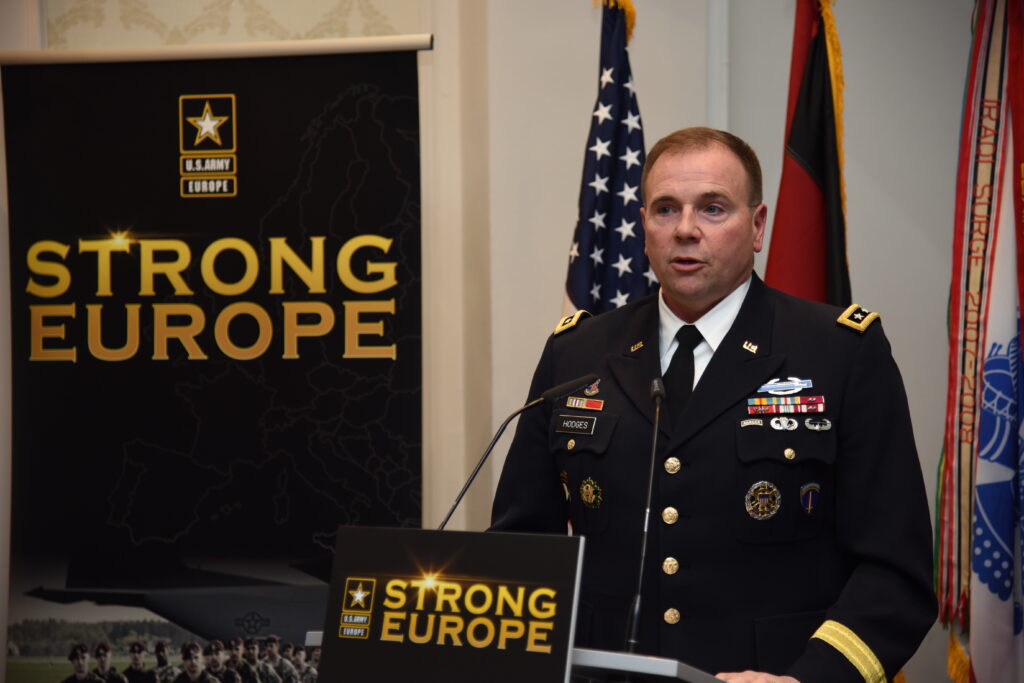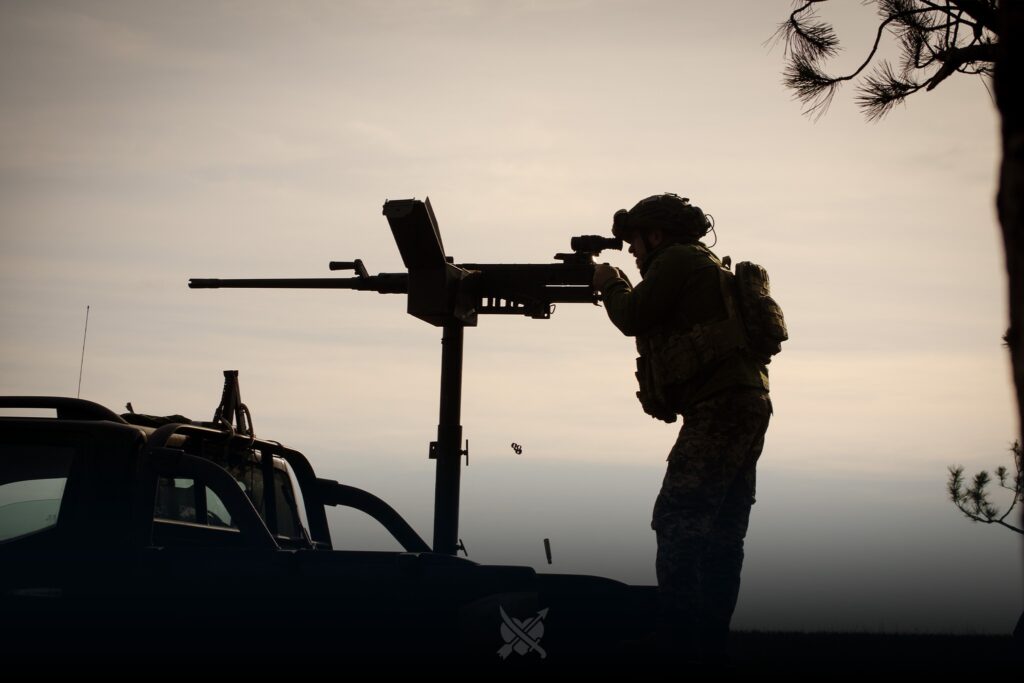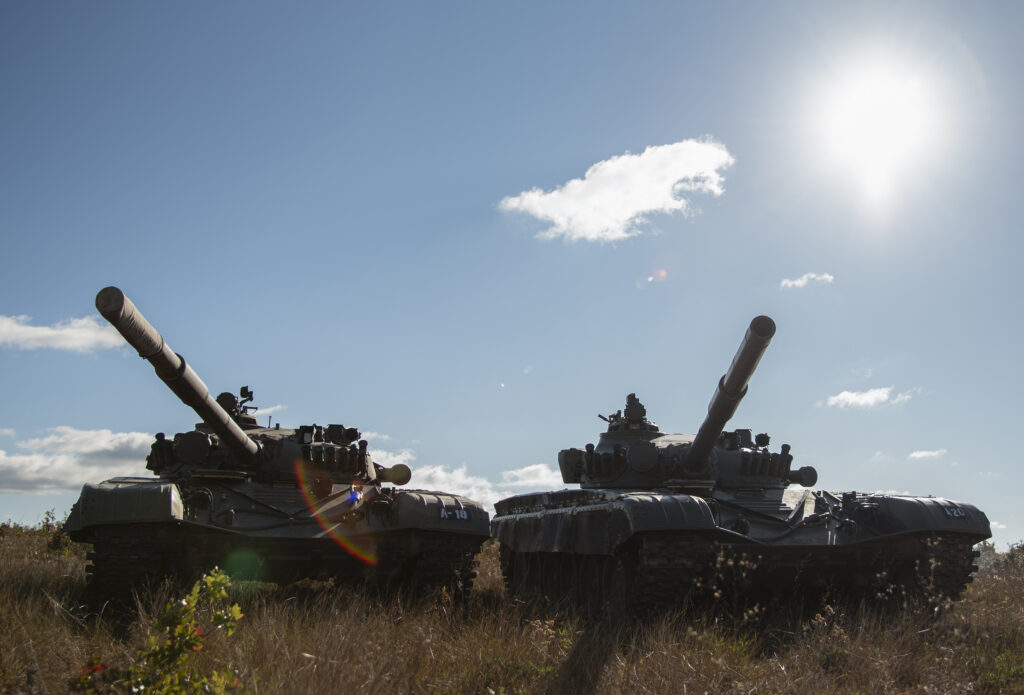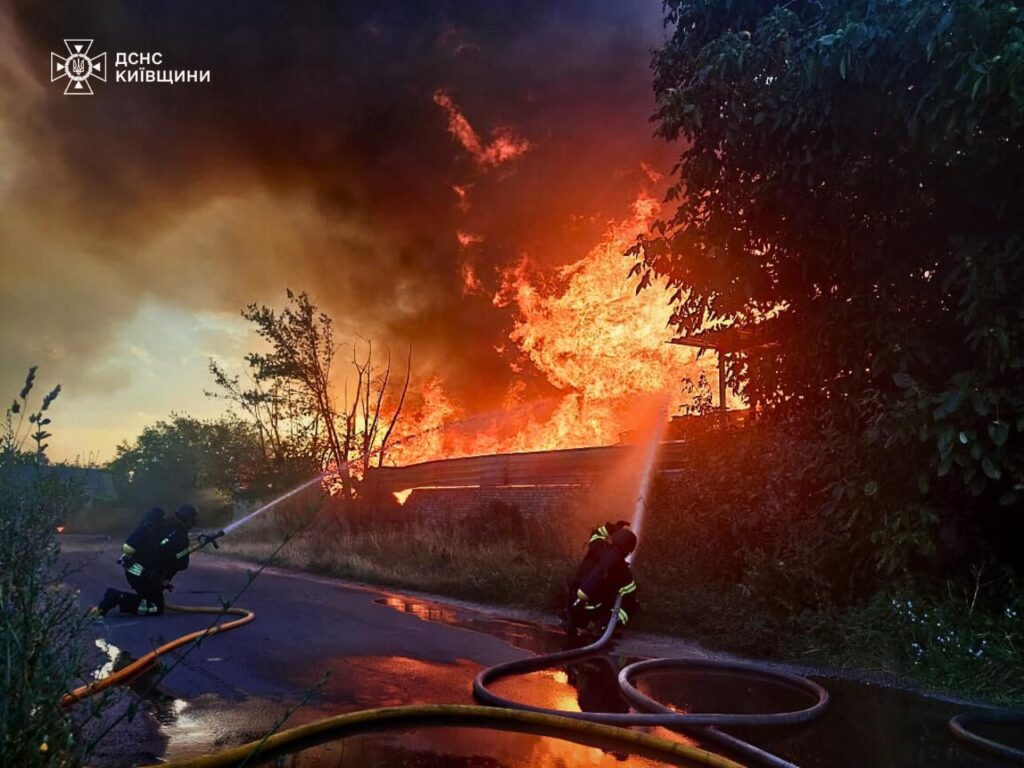WASHINGTON, D.C. (Independence Avenue Media) – Retired U.S. Lieutenant General Ben Hodges, speaks with Independence Avenue Media about recent shifts in U.S. policy toward Ukraine and what these changes may indicate about the broader strategic outlook adopted in Washington.
In a wide-ranging interview, the former commanding general of U.S. Army Europe reflects on the Biden and Trump administrations’ approach to supporting Ukraine after February 2022, including concerns about inconsistent messaging from the White House, lack of publicly articulated strategic objectives, and the impact of policy delays on the ground.
He also discusses NATO’s evolving global posture, Germany’s internal debates over military aid to Ukraine, and what’s needed for Ukraine to sustain its defense efforts and, ultimately, to succeed in affirming its territorial integrity and sovereignty. Hodges underscores that air defense systems, long-range strike capabilities, and steadfast political will among allies in the West remain critical to the war effort.
The conversation also touches on broader geopolitical dynamics — Russia’s hybrid activities in the Baltic Sea; what U.S. foreign policy communicates to adversaries like the Chinese Communist Party (C.C.P.); and reflections on Europe’s role in shaping outcomes in Ukraine and beyond.
This interview, recorded on July 8, 2025, was edited for length and clarity.
Independence Avenue Media Editor in Chief Ia Meurmishvili: President Donald Trump announced, that the U.S. would resume sending defensive weapons to Ukraine. What do you think happened? Why did he change his position?
Lieutenant General (Retired) Ben Hodges, former Commanding General of U.S. Army Europe: What we’re seeing are some of the symptoms of not having a normal national security council process, where somebody is helping with coordination across all the different agencies on the content, as well as the decision, and then the messaging. And this looks like the decision to say we’re going to stop it was made over at the Pentagon either by Secretary Hegseth or by his Under Secretary of Defense for Policy, Elbridge Colby. And then they had to come up with a reason for it, which was, well, we need to review and see if we have enough of our own.

That was immediately exposed as not being true. And then three days later, the president apparently has reversed the decision that had been made by his secretary of defense. So I would like to think that the president had a great phone call with President Zelensky, which reportedly was a good call back on Friday, and that he was very frustrated with his last call with President Putin, and that he finally has reached the point where he’s so angry that Putin is playing him, and he realizes that Putin has been playing him, that, okay, I’m going to quit hoping that Putin is serious about negotiating, and I’m going to help President Zelensky at least with protecting the innocent people in his own country that have been getting killed.But this is not normal times or normal processes, so it’s a little bit difficult to know for sure what actually caused this change.
Meurmishvili: Do you think President Trump has any change of heart towards, particularly, President Putin? He has been willing to give Putin a longer rope, so to say, saying “two weeks, two weeks” and those two weeks never ended. Yesterday, he said that he was disappointed with Putin. Do you think there’s a change in his attitude towards Putin?
Hodges: I sure hope so, because right now, or up until now, if you wanted to design a policy that was guaranteed to help Russia win and Ukraine lose, that’s what the United States has been doing for the past few months. Putin could see that, of course, that we didn’t have a clever approach to the negotiations and he has demonstrated his lack of respect for the United States and for the president. It’s like almost every time there’s a phone call, that night the Russians launched hundreds of drones against Ukrainian cities. Clearly they have no interest in actual negotiations, but they’ve been happy to allow President Trump to kind of nurse the idea that maybe there is a way to get to negotiations. I hope that we finally reach the point where the president realizes that this was never going to happen unless the United States does something meaningful to inflict consequences on Russia and to help Ukraine.
Meurmishvili: Initially it was, during the Biden administration, that we’ll stand with Ukraine for “as long as it takes.” Now, President Trump does not even say anything like that. And we don’t even know what the administration is thinking about ending the war, except for President Trump wants the killing to stop. How do you think it would be possible to get the U.S. to the mindset that Ukraine needs to win? And one thing I would add is that recently there have been a couple very high-level military officials come out and said that “Ukraine is capable of winning this war.” What’s your view on that? Is Ukraine capable of winning the war and is it essential for America to say: “okay, we need to help Ukraine win the war?”
Hodges: The Trump administration is continuing the mistake made by the Biden administration to clearly define the strategic objective. Why are we doing this? Is this charity? Does this help our interests? Is it supporting, protecting our interests in Europe? Why are we doing it? How do we want it to end? And that’s the most important task and it’s difficult to do that sometimes, but this is what’s needed, and then you can develop policies that are effective when you don’t have a clearly defined objective, it’s difficult to have policies that make sense. And of course, we experienced that during the Biden administration. And now you’re exactly right that there is no clearly defined outcome other than the president saying, we want the killing to stop.

He actually could achieve that very quickly by making it clear to the Russians who are clearly the aggressor here, that if you don’t stop, if you don’t withdraw, here’s the terrible things that we’re going to do to you, Russia, and your economy, and your place in the world. The United States has leverage over Russia that Trump has never had before in terms of economic power, the ability to provide things, and to encourage allies to provide things to Ukraine. To say, I just want the killing to stop, everybody does except Vladimir Putin. That’s not the end state. The end state has to be something that respects Ukrainian sovereignty and that will have the positive effect on European economies, which is important to America’s economy. And it can help get to a place where the reconstruction of Ukraine can happen, which will be important for everybody that depends on Ukraine for grain and energy and rare materials, et cetera.
And, also that would send a message to China that the United States is committed to protecting sovereignty and international law, freedom of navigation, all of these things. But for some reason, the administration still does not either, either they don’t care or they don’t understand the nature of this war, why Ukraine is fighting, why this matters, who’s the aggressor. Until they get that right, then I think we’ll forever be talking about bad policy decisions.
Meurmishvili: Well, based on the latest statements — maybe we’re getting to the point where the administration is willing to articulate that Russia is the aggressor. The countries that understand that very well border Russia, of course, the Baltic States, Poland, others. Some of their intelligence services assess that Russia is building up its capabilities on NATO borders and may well test the alliance in 3-5 years. What do you think about this – are we at a point where Russia may test NATO?
Hodges: Well, of course, they are testing us right now with their constant disruption and destruction of underwater infrastructure in the Baltic Sea, violations of airspace, these illegal shadow fleet vessels exporting oil out through the Baltic Sea as well as the Black Sea. And the other things that they’re doing that are just below the threshold of Article 5 type of attack [Article 5 of the North Atlantic Treaty, which established NATO, states that an armed attack against one or more of the Allies shall be considered an attack against the entire Alliance]. But nonetheless, it’s Russia using everything from disinformation and criminal activity to sabotage and destruction of property and violations of international law to see what we’re going to do. So far we have not done a good job of inflicting consequences on the Russian side so that they stop. This is going to require, I think, the Alliance or at least the nations around the Baltic Sea, for example to start doing things such as what Germany just announced, that they’re going to begin stopping ships and checking for insurance, proper insurance, which is a good approach to these crappy vessels that are probably not correctly insured and they are environmental disasters waiting to happen if there’s an accident. This is a way that nations can use the law to help inflict some consequences on the Russian side.


Now that’s only one part of this. If we don’t demonstrate that we’re able to act together and hold them accountable for their violations, then I think they will continue to push and push and ooze, if you will, closer and closer to where they have put themselves in a position of advantage for a possible conventional type attack somewhere like in Latvia, for example.
The Finns, of course, take this very serious, as do Estonia, Latvia, Lithuania, Poland, Romania. I think other nations are realizing that if Ukraine fails, if they don’t help Ukraine actually defeat Russia or stop Russia, then they’re going to be next on the menu, perhaps after Moldova or Georgia.
So, it’s in the interest of Europe that Ukraine is successful. And more leaders are coming to that realization, especially if they’re not certain that the United States will be dependable in helping this.
Now, you asked me something earlier and I failed to answer it, but I’ve just been, I just reminded myself that yes, Ukraine can still win. And I was impressed by the new SACUR [Supreme Allied Commander] General Alexus Grynkewich who understandably goes by the call sign Grynch, when he was asked during his confirmation hearing, can Ukraine win? And he said, yes. That impressed me because that’s counter to what the White House and the Secretary of Defense have indicated. So that tells me he’s got, not only does he have the same or a good judgment, and that’s what General [Christopher] Cavoli [who was previous Supreme Allied Commander Europe] had said previously, but he also has the courage to give his best professional advice, which is vital.
Meurmishvili: Let’s stay on NATO for a moment – do you think the recent commitment to increasing defense spending to 5% of GDP is a realistic goal or it’s mealy a lip service by the Allies?
Hodges: It is realistic because back during the Cold War, most nations were spending close to 5 % anyway. The German Bundeswehr was huge. The British Army, huge. Even the Dutch Army was huge. So we were all spending at that level because we knew that we needed capabilities to deter the Soviet Union and we did it for over four decades. So yes, it is realistic to get back to the 5%, especially when you think of way it’s been organized so that 1.5 of that actually goes to infrastructure such as rail capacities, airports, seaports, cyber protection, things that are necessary for effective deterrence and defense. And then the remaining 3.5 would go towards traditional defense spending. Actually 3.5 is not that big a leap from 2%. But the other part of your question is also correct that is this lip service. I think there are some nations that know for a fact that they will not reach it in 10 years, but that’ll be some other government’s problem. It’s not that hard to say, yes, of course we’ll agree to it knowing that they won’t be around or have to actually implement it.
But it does represent on the other hand, a recognition because even if these governments, if certain governments had said, look, I’m never going to get there. I know that. A recognition that they would still have to sell that to their own parliaments and their own populations, meaning that they recognize that there is a real threat and you have to act responsibly towards that threat. A country like Canada, for example, still has not reached 2% and you’re talking about a very large, very wealthy oil exporting nation that is capable of doing a lot more. And they have responsibilities on the Pacific side, as well as in the transatlantic relationship, and of course, they’re critical for the Arctic. This is where nations, leaders have to make those hard choices about, you know, where do we prioritize? The UK is going through this right now, and there’s a lot of pressure on the government to do more in terms of the National Health Service or dealing with immigration or things like that, not just on defense spending. And the problem is if the population doesn’t believe that there really is a threat or if they don’t feel it, or if they don’t trust that their government’s giving them accurate assessments, then they are obviously naturally gonna be reluctant to pay more money for defense.
Meurmishvili: In the context of Ukraine being able to win the war – how do you assess Ukraine’s asymmetric capabilities?
Hodges: I think that Ukraine continues to get better with each passing week in terms of their own defense industry, their technology, their ability to strike targets deep inside Russia. They’ve made it clear that there is no safe space anywhere inside Russia. Where they are having challenges, of course, they don’t have enough air defense to protect their own people against these Russian attacks that happen every night, and they have not yet figured out how to effectively counter the different types of drones that Russia is using. So I think Ukrainians, while trying to protect their population, we’re going to see more and more attacks on the factories that produce drones and missiles, more attacks on the defense industry and as well as on the various places from which the Russians are launching these attacks. This is going be very hard and it’s why getting air defense capabilities to them is I think at the top of their list for what they need.
Meurmishvili: Chancellor [Friedrich] Merz was very energetic and supportive of Ukraine initially. We have not seen much action recently coming from Germany, especially as it relates to sending Taurus cruise missiles to Ukraine. Since you’re based in Germany, what’s your view on Germany and German involvement in this bigger goal of helping Ukraine win?
Hodges: Well, I think the Chancellor Merz is serious about what he has said about helping Ukraine as much as possible. But of course, he leads a coalition government that has significant challenges in terms of the opposition, as well as holding together the coalition. His coalition partner has a left wing to it that has been very anti-Ukraine or at least anti-getting involved. And so he’s got to do what every leader of a coalition government has to do is to figure out how to accomplish the objectives without losing the coalition. I think he’s looking for ways, for example, to help Ukraine with its long range precision strike capability that might, whether that’s newer and larger drones or other capabilities. There’s been so much talk about Taurus and I wish he would deliver hundreds of them today but that has almost become a it’s been talked about so much. It’s t’s almost become a thing that You know you can’t get across the gold line and so maybe he’s looking for other ways to help. I would say the vast majority of Germans with whom I speak are sympathetic to Ukraine. They also understand that if Ukraine fails, Germany will pay an enormous price in terms of refugees that would be headed straight into Germany.
Meurmishvili: General Hodges, thank you very much.
Hodges: Well, thanks for opportunity and I love your new program in the name Independence Avenue. That’s very cool.


